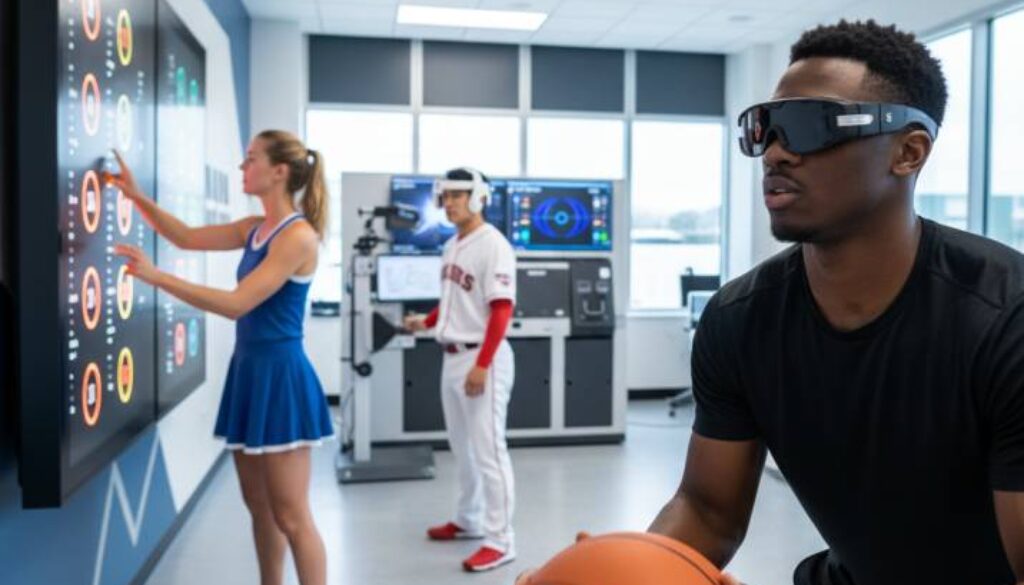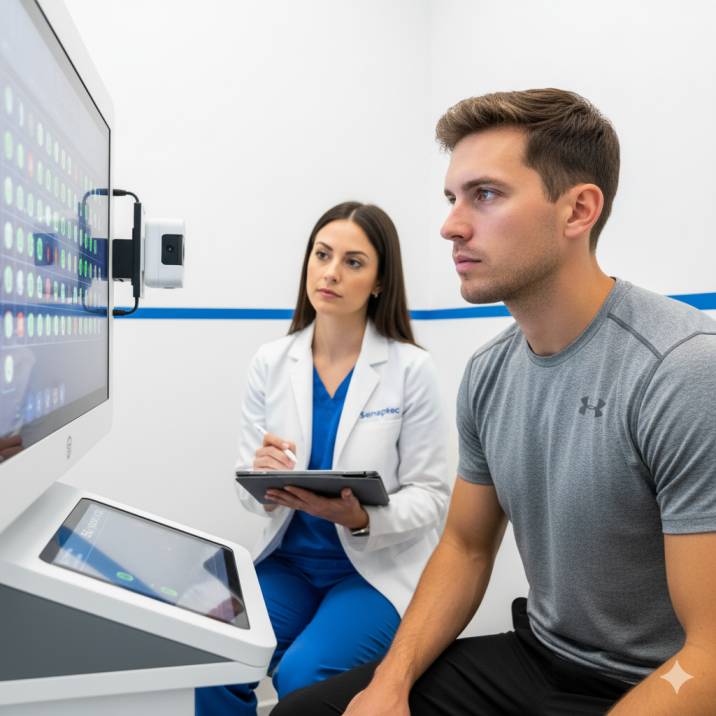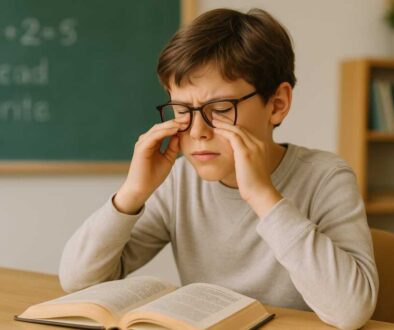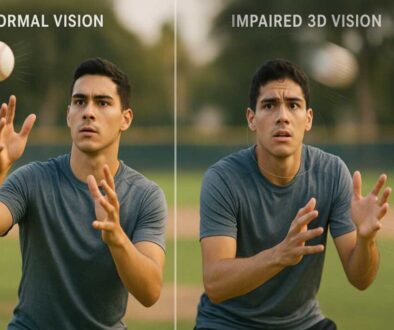Vision Therapy for Athletes: Improving Sports Performance

In the world of competitive athletics, the difference between victory and defeat often comes down to split-second decisions and lightning-fast reactions. While athletes dedicate countless hours to perfecting their physical strength, speed, and endurance, many overlook a critical component that could give them the ultimate competitive edge: vision therapy for athletes. This specialized training approach, also known as eye training for athletes, is revolutionizing how sports professionals approach performance enhancement.
At Cook Vision Therapy Center, with over 40 years of specialized expertise under Dr. David Cook’s leadership, we’ve witnessed firsthand how targeted vision training can transform athletic performance. From professional baseball players tracking 95-mph fastballs to tennis athletes anticipating serves, the visual system serves as the primary gateway for athletic success. Vision accounts for 85-90% of sensory processing during sports activity, making it a critical target for performance enhancement through structured vision therapy programs.
Understanding Vision Therapy for Athletes: Beyond 20/20 Vision
Vision therapy for athletes extends far beyond traditional eye examinations that simply measure visual acuity. While having 20/20 vision provides a foundation, athletic success demands a complex array of visual skills that standard eye tests cannot evaluate or improve. Sports vision training focuses on developing specific visual abilities that directly impact athletic performance, including reaction time, depth perception, peripheral awareness, and eye-hand coordination.
“The eyes guide the body. In sports, what you see and how quickly you process that information determines your success on the field.”
— Blanton Long Collier, Former NFL Coach
Core Visual Skills Enhanced Through Vision Therapy
Professional vision therapy programs target multiple visual competencies that directly translate to improved athletic performance:
Dynamic Visual Acuity
This skill enables athletes to maintain clear vision while objects are in motion. Essential for sports like hockey, basketball, and tennis, dynamic visual acuity training helps athletes track fast-moving balls, pucks, or opponents with precision. Research from the Journal of Sports Science and Medicine demonstrates that athletes can improve their dynamic visual acuity by up to 35% through targeted training exercises.
Depth Perception and Spatial Awareness
Accurate distance judgment separates elite athletes from their competitors. Whether it’s a golfer reading the green, a quarterback assessing field positioning, or a tennis player positioning for a volley, superior depth perception provides the spatial intelligence necessary for precise execution. Vision therapy exercises specifically target binocular coordination to enhance three-dimensional visual processing.
Eye-Hand Coordination
The synchronization between visual input and motor response forms the foundation of athletic excellence. Through specialized eye training exercises, athletes develop the neural pathways that enable instantaneous coordination between what they see and how their body responds. This skill proves particularly valuable in baseball batting, tennis returns, and basketball shooting.
Peripheral Vision and Field Awareness
Elite athletes possess exceptional peripheral awareness that allows them to monitor teammates, opponents, and field conditions simultaneously while maintaining focus on primary targets. Vision therapy training expands peripheral recognition and trains athletes to process multiple visual inputs without losing concentration on their immediate objectives.
Scientific Evidence Supporting Sports Vision Training
The effectiveness of vision therapy for athletes is supported by extensive scientific research published in peer-reviewed journals. Three recent studies provide compelling evidence for the performance benefits of structured eye training programs:
Study 1: Skeet Shooting Performance Enhancement
A 2024 study published in Frontiers in Human Neuroscience examined 20 elite skeet shooters who underwent six weeks of sports vision training using the Senaptec Sensory Station. Results showed significant improvements in Near-Far Quickness, Perception Span, and Eye-Hand Coordination, with participants achieving enhanced hit accuracy and more precise shotgun control. The study concluded that vision training provided athletes with shorter reaction times and more economical movement patterns.
Source: Frontiers in Human Neuroscience – Impact of Sports Vision Training
Study 2: Golf Putting Under Pressure
Research published in Scientific Reports in 2024 investigated quiet eye training effects on golf putting performance under pressure conditions. The study involved 22 athletes from the National Golf Junior Team and found that participants who underwent quiet eye training experienced increased hit rates, decreased anxiety levels, and improved visual fixation patterns when putting under pressure situations.
Source: Scientific Reports – Quiet Eye Training Research
Study 3: Comprehensive Sports Vision Training Review
A comprehensive systematic review published in 2024 analyzed 126 articles testing sports vision training across multiple athletic disciplines. The research found that while most studies reported improvements in generic and sports-specific visual abilities, the strongest evidence for performance enhancement came from naturalistic training approaches where exercises were conducted with sport-specific stimuli and tasks.
Source: Systematic Review of Sports Vision Training Literature
Sport-Specific Vision Training Applications
Different sports require distinct visual skill sets, and effective vision therapy programs must be tailored to address sport-specific demands. Professional athletes across various disciplines have integrated specialized eye training into their preparation routines:
Baseball and Softball
Baseball players require exceptional visual tracking abilities to follow pitches traveling at speeds exceeding 90 mph. Vision training focuses on improving pursuit eye movements, enhancing contrast sensitivity for recognizing different pitch types, and developing anticipatory skills for reading pitcher intentions. Many MLB teams now incorporate vision evaluations during spring training to assess and improve player visual performance.
Basketball
Basketball athletes benefit from peripheral vision training that enables simultaneous monitoring of teammates, opponents, and court positioning while maintaining focus on ball control. Specific exercises target peripheral awareness, rapid decision-making under pressure, and shooting accuracy through enhanced visual-motor coordination.
Football
Football players, particularly quarterbacks and receivers, require sophisticated visual processing abilities for field recognition, defensive coverage analysis, and precise timing coordination. Vision training emphasizes rapid visual search patterns, peripheral awareness for safety, and enhanced reaction times for avoiding collisions.
Tennis and Racquet Sports
Tennis players must process visual information about ball trajectory, spin, and opponent positioning within milliseconds. Professional tennis players utilize vision training to improve their return of serve capabilities, enhance anticipation skills, and maintain visual focus during extended rallies.
Vision Therapy Training Methods and Technologies
Modern sports vision training incorporates both traditional exercises and cutting-edge technology to maximize athlete development. Professional vision therapy centers utilize comprehensive assessment protocols and customized training programs:
Traditional Training Exercises
Foundational vision therapy exercises include:
- Brock String exercises for binocular coordination and depth perception
- Near-far focus shifts to improve accommodation flexibility
- Saccadic eye movement drills for rapid target acquisition
- Peripheral awareness training using specialized charts and devices
- Pursuit tracking exercises with moving targets
Advanced Technology Integration
Contemporary vision therapy centers employ sophisticated technology platforms:
- Senaptec Sensory Station for comprehensive visual assessment and training
- Virtual Reality (VR) training environments for immersive practice scenarios
- Strobe training glasses for enhanced visual processing under challenging conditions
- Eye-tracking systems for precise measurement and feedback
- Computer-based training programs with sport-specific scenarios
The Cook Vision Therapy Center Advantage: Four Decades of Excellence
Cook Vision Therapy Center stands as Atlanta’s premier destination for sports vision training, combining Dr. David Cook’s 40+ years of specialized experience with cutting-edge treatment protocols. Our exclusive focus on vision therapy—with no routine eye exams or glasses sales—ensures that every resource is dedicated to achieving measurable performance improvements for our athletes.
Specialized Expertise and International Recognition
Dr. David Cook’s international recognition as a leading vision therapy authority, combined with Dr. Ekta Patel’s specialized training, provides athletes with access to the most advanced treatment protocols available. Our practice has successfully treated thousands of patients, developing refined techniques specifically designed for athletic performance enhancement.
Non-Surgical Innovation
Our commitment to non-surgical treatment alternatives aligns perfectly with athletes’ needs for safe, effective performance enhancement. Vision therapy provides measurable improvements without the risks associated with surgical interventions, making it an ideal choice for competitive athletes at all levels.
Geographic Leadership in Metro Atlanta
Located in Marietta, Cook Vision Therapy Center serves the underserved northwest Atlanta suburbs, providing specialized care not readily available elsewhere in the region. Our strategic location makes advanced sports vision training accessible to athletes throughout Metro Atlanta, from Roswell and Duluth to Sandy Springs and Midtown.
Comprehensive Benefits of Vision Therapy for Athletes
Athletes who undergo professional vision therapy experience improvements across multiple performance dimensions:
Enhanced Athletic Performance
- Improved reaction times enable faster responses to game situations
- Enhanced accuracy in ball tracking, targeting, and spatial positioning
- Better hand-eye coordination for improved control and precision
- Increased peripheral awareness for superior field recognition
- Enhanced decision-making capabilities under pressure
Injury Prevention and Safety
Improved visual skills contribute significantly to injury prevention by enhancing athletes’ ability to anticipate potential collisions, recognize obstacles, and maintain better spatial awareness during competition. Research indicates that athletes with superior visual processing abilities experience fewer contact injuries and demonstrate better protective instincts.
Sustainable Competitive Advantage
Unlike physical training that may plateau, visual skills can continue improving throughout an athlete’s career. Vision therapy provides a sustainable competitive advantage that enhances performance while supporting longevity in athletic pursuits.
Getting Started with Vision Therapy for Athletes
Beginning your vision therapy journey requires a comprehensive evaluation to assess current visual capabilities and identify areas for improvement. At Cook Vision Therapy Center, our assessment protocol includes:
Comprehensive Visual Assessment
- Detailed evaluation of eye tracking and pursuit movements
- Binocular coordination and depth perception testing
- Peripheral vision and field awareness assessment
- Reaction time and visual processing speed evaluation
- Sport-specific visual demands analysis
Customized Treatment Planning
Based on assessment results and athletic goals, our specialists design individualized treatment protocols that target specific visual deficiencies while enhancing existing strengths. Treatment plans typically include in-office therapy sessions combined with home-based exercises to maximize improvement rates.
The Future of Sports Vision Training: 2025 and Beyond
The field of sports vision training continues to evolve with technological advancement and increased research focus. Emerging trends indicate significant developments in virtual reality integration, artificial intelligence-powered training protocols, and personalized therapy approaches based on genetic and physiological factors.
Emerging Technologies and Trends
- Virtual Reality (VR) training environments for immersive sports scenarios
- Artificial Intelligence-powered assessment and training customization
- Advanced eye-tracking systems with real-time performance feedback
- Neurofeedback integration for enhanced brain-eye coordination
- Portable training devices for convenient practice anywhere
Expanding Research Foundation
Bibliometric data indicate significant research growth in sports vision training, with publications increasing from 118 studies in 2015 to over 260 by 2023. This expanding evidence base continues validating the effectiveness of vision therapy for athletic performance enhancement across diverse sports disciplines.
Take the Next Step Toward Athletic Excellence
Don’t let visual limitations hold back your athletic potential. Cook Vision Therapy Center’s specialized programs have helped thousands of athletes achieve measurable performance improvements through targeted vision training. Our exclusive focus on vision therapy, combined with Dr. David Cook’s internationally recognized expertise, ensures you receive the most advanced treatment available.
Located in Marietta, Georgia, we serve athletes throughout Metro Atlanta, providing life-changing vision therapy that transforms how you see, react, and perform in your sport. Contact us today to schedule your comprehensive evaluation and discover the competitive edge that professional vision therapy can provide.
References and Resources
The research and insights presented in this article are supported by peer-reviewed scientific studies. Below are the primary sources cited:
- Impact of Sports Vision Training on Visuomotor Skills and Shooting Performance in Elite Skeet Shooters
Frontiers in Human Neuroscience (2024)
https://www.frontiersin.org/journals/human-neuroscience/articles/10.3389/fnhum.2024.1476649/full
This study demonstrates how six weeks of sports vision training using the Senaptec Sensory Station significantly improved visuomotor abilities and shooting accuracy in elite athletes.
- The Effect of Quiet Eye Training on Golf Putting Performance in Pressure Situations
Scientific Reports (2024)
https://www.nature.com/articles/s41598-024-55716-z
Research involving 22 athletes from the National Golf Junior Team showed how quiet eye training improved putting accuracy and reduced anxiety under competitive pressure.
- Training Vision in Athletes to Improve Sports Performance: A Systematic Review of the Literature
Psychology of Sport and Exercise (2024)
https://www.tandfonline.com/doi/full/10.1080/1750984X.2024.2437385
Comprehensive systematic review analyzing 126 studies across multiple sports, providing evidence for the effectiveness of naturalistic sports vision training approaches.
Conclusion: Unlocking Your Athletic Potential Through Vision Therapy
Vision therapy for athletes represents a scientifically validated approach to performance enhancement that addresses the often-overlooked visual component of athletic success. As research continues demonstrating the effectiveness of structured eye training programs, more athletes are discovering the competitive advantages available through professional vision therapy.
At Cook Vision Therapy Center, our four decades of specialized expertise, combined with cutting-edge treatment protocols, provide athletes with the comprehensive visual training necessary to achieve peak performance. Whether you’re a professional athlete seeking marginal gains or a recreational player looking to improve your game, vision therapy offers measurable benefits that extend far beyond traditional physical training.
Ready to discover how vision therapy can enhance your athletic performance? Contact Cook Vision Therapy Center today to schedule your comprehensive visual assessment and begin your journey toward visual excellence.
FAQs
-
Vision therapy for athletes is a customized program of exercises that enhances visual skills like eye-tracking, focus, peripheral vision, and hand-eye coordination through specialized drills and activities under professional supervision.




